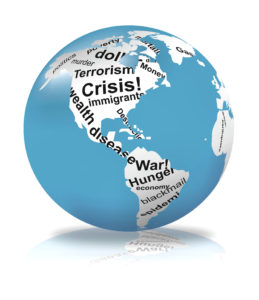Talk about the Pot and the Kettle!
From today’s NY Times email newsletter, “The Morning”:
President Trump does not seem interested in de-escalating anything in Minneapolis. This week, he said that one justification for the shooting of Renee Good might have been that she had been “disrespectful” to officers. Being disrespectful is a form of speech, though — one protected by the Constitution.
With Trump, it’s always a clue that if he accuses someone of bad behavior, he is doing/has done it himself. This is on the same day that news broke about Trump giving the finger and two F-bombs to a Ford employee who called him out as a “pedophile protector”—which the Times mentioned in that same newsletter. The link above is to The Guardian, because the Times uses paywalls.
But Trump showing the emotional maturity of a two-year-old yesterday is just the latest in a lifetime flinging insults at individuals, groups, and whole countries. This is what he said about racism in 1989 (followed by the response decades later by a Black commentator whose offer to Trump to tour Baltimore after Trump disparaged that city was declined). 1989 was also the year he ran a full-page ad in all four of NYC’s daily newspapers calling for the death penalty for five Black youths falsely convicted of rape and later exonerated.
And ever since he rode that golden escalator to announce his candidacy in 2015, it’s been a nonstop barrage. He mocked a reporter’s physical disability. He called Africa, Haaiti, and El Salvador “shithole countries” and called for increased immigration from Norway (a White-predominant country) in 2018 and—just a month ago, on December 9, 2025—not only admitted the comment (which he’d denied at the time) but bragged about it and added Somalia to the list. For years, his racism led him to deny that Obama was born in the US. If that lie were true, Obama would have been ineligible to serve as President. He repeatedly attacks and insults his opponents—Biden and Harris, of course—but even former loyalists that he drove away, including then-Vice President Mike Pence and one of his biggest loyalists in Congress, Marjorie Taylor Greene. And his history of insulting and objectifying women—individuals as well as women as a class—is just as bad as his racism and ableism.
Worst of all, the vile xenophobic anti-immigrant rhetoric of his first campaign and term has not just increased. It has morphed into something truly evil: a war against immigrants that empowers a poorly trained, poorly vetted goon squad army of ICE and CBP agents to rain terror down on immigrant neighborhoods, whose residents are snatched from cars, homes, workplaces, and even their immigration court hearings—with zero due process and extreme violence—and sent to far-away gulags in the US and in countries where these victims have no connection. The conservative Cato Institute lists a multipronged attack on immigrants and citizens, from revoking legal status of people who came here legally to multiple attacks on the Constitution and due process. This is unlike anything in US history. It’s even more extreme than the detention of Japanese immigrants and descendants during World War II—for which the US has apologized and made reparations. Many US citizens have been caught in these sweeps and illegally detained. And much of what ICE is doing is a wildly illegal expansion of the powers they are chartered with. They are not supposed to take a police role other than in matters of illegal immigration (as I document in the Appendix, below). And they are not supposed to shoot people. Yet, Time Magazine reports today that “Immigration agents have fired at or into civilian vehicles in at least 13 instances since July.” That would include the two people shot since the murder of Renee Nicole Good last week, in Portland, Oregon. At least four of those were fatal. Add to that the 32 people who died in ICE custody in the past year.
Trump’s hypocrisy takes many other forms, too. Examples:
- He’s praising protesters in the streets of Tehran even as he decries them in any state that voted for Kamala Harris.
- Killing more than 100 Venezuelan sailors (95 as of November when this article was written), then invading the country and kidnapping its (admittedly thuggish) leader on the pretext of interdicting drugs, but pardoning the biggest drug dealer of them all, former President Hernandez of Honduras. Of course, we all know and he hasn’t tried to hide that it’s really about the oil.
- Claiming to be a law-and-order president but inciting the January 6, 2021 riot at the Capitol and then pardoning even those rioters who physically attacked police officers.
Please let your Representative and two Senators in the US Congress know that you find this unacceptable and you want them to withhold funding from ICE until it starts obeying all relevant laws on search and seizure, delineation of responsibility, due process, and use of force. If they balk at that, defund the agency at least until Minnesota is allowed to fully participate in the investigation of Good’s murder—and then keep pressing for more accountability. And please share this post widely.
Appendix: Perplexity.AI Report on what ICE is and is Not Allowed to Do
I asked Perplexity, the AI engine I tend to use for serious research and factchecking, “In what situations is US Immigration and Customs Enforcement allowed or not allowed to act as local police do?” Because both AI and traditional search engines may or may not return the same results for the same search, and because AI results are not written by a human and therefore not subject to copyright, I’m copying the entire answer. Drawing on ten different sources including the BBC, the Massachusetts state government website, and the ACLU, it is quite illuminating:
is a federal civil immigration agency, not a general police force, so it can enforce federal immigration and certain federal criminal laws but cannot simply “act like” local police enforcing state or local law. Its actions are further limited by the U.S. Constitution, federal statutes, and by how much local police choose or are allowed (under state law) to cooperate.?
What ICE is allowed to do
Enforce federal immigration law. ICE can stop, detain, and arrest people it has probable cause to believe are removable (deportable) from the U.S., and can place them in immigration detention and initiate deportation cases.?
Enforce certain federal crimes. ICE can investigate and bring cases involving immigration-related crimes like human trafficking, document fraud, and smuggling under federal criminal statutes.?
Make public?space arrests with probable cause. In public places, ICE may arrest someone if agents have probable cause the person is removable and likely to escape before a warrant can be obtained; they may also execute valid arrest warrants in public.?
Enter homes with judicial warrants or consent. ICE may enter a private home only with the occupant’s voluntary consent or a judicial warrant signed by a judge; an internal ICE “administrative” warrant alone does not authorize entry into a private residence.?
Conduct raids and surveillance within legal limits. ICE can conduct operations at homes, workplaces, and in communities and can use data collection and digital surveillance tools, subject to constitutional limits on searches and seizures.?
Request help from local law enforcement. ICE can ask local agencies to notify them when someone is being released or to hold a person briefly through “detainers,” and can enter formal agreements (287(g)) that deputize some local officers to perform limited immigration functions.?
What ICE is not allowed to do
Cannot enforce state or local non?immigration laws. ICE does not have authority to enforce purely state or local offenses (like routine traffic violations or most state criminal laws) unless a separate federal authority applies.?
Cannot enter homes using only an ICE form. An ICE administrative warrant (Form I?200/I?205) does not let agents force their way into a private home; without consent or a judicial warrant, they must stay outside or in common/public areas.?
Cannot force local police to act as immigration officers. Local agencies cannot be compelled to carry out civil immigration enforcement; they decide whether to cooperate, and many jurisdictions legally limit that cooperation.?
Cannot use detainers as binding orders. ICE detainers are requests, not mandatory orders; local agencies may violate state law or the Constitution if they hold someone past their release time without proper legal authority.?
Must comply with the Constitution. ICE arrests, searches, and detention are constrained by the Fourth Amendment and due process requirements, just like other law enforcement; unconstitutional stops, searches, or holds can lead to liability.?
How ICE differs from local police
Scope of authority. Local police are generalists enforcing broad state and local criminal laws within a limited geographic area, while ICE has a narrow subject?matter focus (immigration and related federal crimes) but nationwide reach.?
Civil versus criminal. Much of what ICE does is civil (removal/deportation) rather than criminal prosecution, so ICE can detain someone for immigration violations even when no crime is charged, which is different from typical local policing.?
Limits on cooperating with ICE. Many cities and states have “sanctuary” or similar policies that allow cooperation on serious criminal matters but forbid or restrict participation in routine civil immigration enforcement.?
When ICE and local police can overlap
Joint operations on crime. Local police may work with ICE when investigating federal crimes (for example, human trafficking or gang cases) where immigration issues also arise.?
287(g) agreements. Under 287(g) “jail?enforcement” agreements, certain local jail officers are trained and authorized to perform specific immigration tasks (like issuing charging documents or detainers) under ICE supervision, but they still must follow constitutional and state?law limits.?
Information sharing and notifications. Where allowed by state and local law, police may share booking information or give ICE notice of a person’s release, even if they cannot legally hold the person longer just because ICE asked.?
Situations where ICE is more restricted than local police
Protected or sensitive areas (policy?based). For years, ICE policies limited enforcement in places like schools, hospitals, and churches, though recent DHS actions have rescinded some of those “sensitive location” protections; policy can be more restrictive than what the Constitution alone requires.?
Entering private spaces. Local police with state?court warrants for state crimes may enter a home to arrest a suspect; ICE, by contrast, often relies on administrative warrants that do not permit entering a home without consent, so ICE’s ability to mimic a home arrest by local police is more limited.?
If you want, a follow?up can focus specifically on how these rules work in Massachusetts and what they mean for day?to?day interactions with ICE.


